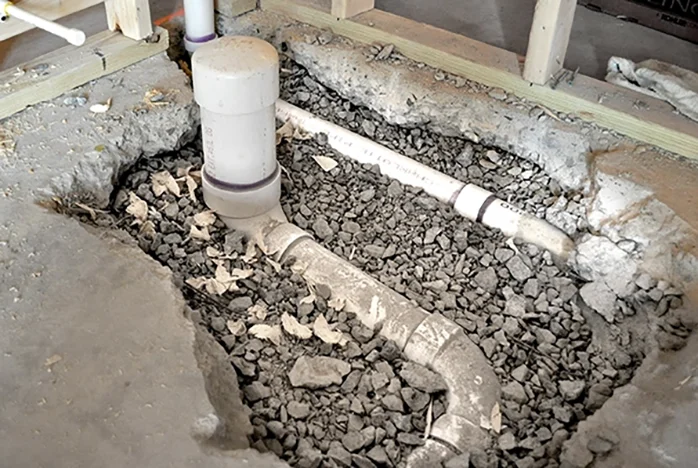
Digging up a basement to replace building drains or sewer pips is not a DIY task—it requires precision, expertise, and the right equipment to ensure the job is done safely and efficiently. Whether you’re dealing with old pipes, persistent drainage issues, or unexpected damage, our team of experts specializes in St. Louis basement dig up, basement excavation and sewer line replacement.
The Dangers of a Broken Sewer Line or Building Drain
When a sewer pipe that runs under the concrete foundation of your home breaks, water or waste seeps into the ground and into your foundation. Because of the extensive damage these broken drain pipes can cause, it’s best for homeowners to take immediate action.
If your home was built prior to 1975, your sewer pipes are most likely made out of cast iron. While cast iron can last up to 100 years, this material has its challenges, including corrosion, blockages, and leaks. When they leak, cast iron pipes deplete local water services and put added pressure on treatment facilities. Broken or misaligned cast iron pipes can contaminate the surrounding soil, causing trace amounts of lead or arsenic from the pipes to eventually leak into the water supply. These pipes will continue contaminating the water and soil if they’re not disposed of properly.
Today, most drain lines are made from PVC piping, copper, or PEX.
Signs of a Broken Sewer Line
Even though these sewer lines are underground, there are some tell-tale signs of a slab leak that homeowners should be aware of. Cement is porous, absorbing water and wicking it towards the surface, so you might notice wet or damp spots on your basement floor, mildew or mold under rugs, or even pools of water. Other potential signs of a broken sewer pipe are:
- The sound of running water under the concrete slab when there is no faucet turned on.
- Cracks in your home’s foundation
- Unusually high water bills
If you notice any of these signs, you should contact a professional right away.
When to Repair or Replace Your Sewer Line
If your cast iron pipes are rusting, disconnected, or damaged by tree roots it’s time to repair or replace them. Our experienced plumbers will perform a camera inspection to determine where the issue is before making a recommendation. If the damage is relatively minor, such as a small section of pipe showing signs of rust, the solution may be relatively minor and affordable.
Various factors, including the location of the pipes, impact the repair process. If the problem areas are easy to reach, a plumber may be able to get in and out quickly, which will typically make for a more affordable repair. If the pipe section is in a remote or otherwise inaccessible area, it will require more labor hours and expertise. The right plumber can help you avoid significant mishaps for more complicated repairs, particularly if you have a larger property to service. Generally, pipe repairs are more affordable than pipe replacements.
When Basement Dig Up Is Necessary
Digging up a basement to replace sewer pipes requires excavating a section of your basement floor to access and replace the damaged section of sewer line that runs underneath. This typically requires digging a trench to expose the existing pipe, remove it, and install a new pipe.
Understanding the Excavation Process
Before digging up your basement, our crew will perform a camera drain inspection to assess the issue and determine the best course of action. Once we have discovered the exact problem and its location, our team will begin the excavation process.
Sewer pipe replacement involves digging a trench in the basement floor to expose the broken section of the sewer line. Depending on the layout of your basement, this may involve digging through concrete or other flooring materials to reach the pipes. Once exposed, the existing sewer line is removed, cleaned out, and replaced with a new one. The plumber will then back fill the hole, patch the basement floor to a rough finish, and haul away the debris.
This rough concrete finish works well for homeowners with an unfinished city or inner ring suburb basement with older, irregular floors. However, if your home is newer or has finished concrete, the new concrete can be a stark contrast and we may recommend hiring a specialty concrete vendor to complete the concrete work to better match your home’s basement floor.
Digging up a basement to replace a sewer line can be expensive due to the labor involved and potential need for concrete repair. Be sure to check whether your local municipality requires permits for sewer line replacements and hire a licensed and experienced plumbing contractor to handle the excavation and pipe replacement.
It’s possible that you won’t need to dig up your basement floor. Here are a few other options for repairing damaged sewer pipes under your home’s basement floor.
An Alternative to Sewer Line Replacement
Trenchless Sewer Repair
To avoid creating a massive trench in your basement floor, you might consider pipe lining or trenchless sewer line repair. Trenches sewer repair uses specialized equipment to replace the sewer pipe without extensive digging, often by pulling a new pipe through the existing one. Instead of breaking up large amounts of concrete slab, only one access hole will need to be dug. After thoroughly cleaning the sewer line with high-pressure water, a pipe liner is pulled through by cable, inflated like a balloon, and allowed to cure. This creates a new pipe within a pipe.
There are many benefits to the trenchless method, most notably that it takes about a third of the time to complete. Because it’s less invasive, you’ll also have far fewer (if any) costs to repair your flooring and other elements of your home after the crew fixes the sewer line.
Replacing sewer pipes by digging up your basement is a significant undertaking, but addressing the issue promptly can prevent costly water damage, foundation issues, and ongoing plumbing headaches. While the process may seem overwhelming, working with experienced professionals ensures the job is done safely and efficiently, restoring your home’s plumbing system for years to come. If you’re experiencing persistent sewer problems, don’t wait until the damage worsens—schedule a camera inspection today to explore your options and protect your home’s foundation and functionality.
Why St. Louis Homeowners Choose Maplewood Plumbing for Building Drain or Sewer Pipe Replacement
Four Decades of Local Expertise
Our expert plumbers understand the unique challenges of St. Louis basements, from our region’s clay soil to our aging infrastructure. Plus, we’ve been St Louis homeowners’ trusted plumbers for plumbing and drain cleaning solutions for 40 years. This long-standing, local knowledge allows us to diagnose problems faster and implement lasting solutions that other plumbers might miss.
Superior Technology and Techniques
- Camera Inspection Equipment: Pinpoint problems without destructive exploration
- Hydro-Jetting Systems: Clear the toughest clogs and build-up
- Leak Detection Tools: Find hidden water issues before they cause damage
- Trenchless Repair Options: Minimize disruption to your property
Transparent, Fair Pricing
- Detailed upfront estimates with no hidden fees
- Multiple solution options to fit your budget
- Financing available for major repairs
- Clear explanation of all recommended work
Water You Waiting For?
Don’t let basement plumbing problems threaten your home’s foundation and safety. Maplewood Plumbing and Sewer has been repairing and replacing sewer lines in homes across St. Louis City and St. Louis County since 1985. Our family owned business prides itself on our solid reputation in the community. Give us a call and see for yourself why our loyal customers won’t use anyone else!
We offer a one-year warranty on all parts and labor excluding washers.
Call 314-645-6350 or schedule online now.


